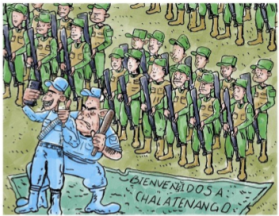As Biden Meets with Central American Presidents, US Aid to Region Takes Turn Against Migrants
On February 24, the presidents of El Salvador, Honduras and Guatemala met with Vice-President Biden in Washington, DC, to discuss the Alliance for Prosperity Plan, a controversial economic and security initiative promoted by the Obama administration and the Inter-American Development Bank ostensibly to stem the the flow of migrants from the region. The meeting comes as the migrant justice movement is escalating actions to demand an end to deportations of Central American asylum seekers from the US, while human rights, environmental, labor and solidarity organizations raise serious concerns about the Alliance For Prosperity’s objectives and consequences.
In December, the US Congress approved $750 million in US assistance to support the Alliance for Prosperity Plan, roughly doubling funding for US State Department activities in the region. The package represents a significant expansion of the same security and economic policies, such as the Central America Regional Security Initiative (CARSI) and the Central America Regional Free Trade Agreement (CAFTA), that have contributed to the high levels of violence and inequality that are fueling displacement from the region, as CISPES’ Executive Director discussed in a recent interview.
CISPES' outspoken critique of US policies that benefit corporate interests at the expense of people and the planet was recently featured in several articles including Think Progress' Experts Say U.S. Aid Package to Central America Is Backfiring Big Time and TeleSur's Big US Aid for Central America Will Worsen Inequality.
The State Department’s statements on Biden’s meeting with the three presidents laid bare the US’s true intentions for the increased aid: stop migrants and refugees from El Salvador, Honduras and Guatemala from reaching the United States – whatever the human cost. State Department official Juan Gonzalez reports that the plan will include efforts to "combat people trafficking, continue efforts to strengthen border security and facilitate the return" of undocumented immigrants deported to the region from the United States. It appears that little remains of the White House’s pitch to Congress to help address the root causes of migration.
Using aid as a carrot and a stick in diplomacy is nothing new for the US government, but the manipulation of funding for a regional development plan into a tool for the southward expansion of its militarized border regime will have deadly consequences.
The day before the Alliance for Prosperity meeting, a group of immigrant rights leaders were arrested in a sit-in in front of the White House to call for an end to raids and deportations. Carrying 83 crosses to represent the 83 people reported to have been killed in 2014 upon returning to El Salvador, Honduras and Guatemala after being deported from the United States, the demonstrators wore red gloves and carried a banner reading, "President Obama: You have blood on your hands.”
On Wednesday, as Biden sat down with the three presidents, another crowd of Central American immigrants gathered to demand that the Obama administration grant Temporary Protected Status (TPS) or another form of administrative relief to migrants and refugees from the region who risk being returned to dangerous and difficult conditions.
Violence is not the only reason that migration from Central America has been on the rise in recent year: reports from the United Nations High Commission on Refugees shows that poverty and family separation are also strong driving forces. But the fate of individuals like the 83 killed last year are perhaps the most visible failure of the US’ immigration system to uphold international protections for people fleeing danger in their home countries. As CISPES' Executive Director told the Washington Post in January, in light of the high levels of violence that El Salvador is currently experiencing, "it's unconscionable [for the Obama administration] to send people back into the same situation."

 "I am a CISPES supporter because continuing to fight for social justice and a more people-centered country means continuing the dream and sacrifice of thousands of my fellow Salvadorans who died for that vision.” - Padre Carlos, New York City
"I am a CISPES supporter because continuing to fight for social justice and a more people-centered country means continuing the dream and sacrifice of thousands of my fellow Salvadorans who died for that vision.” - Padre Carlos, New York City

